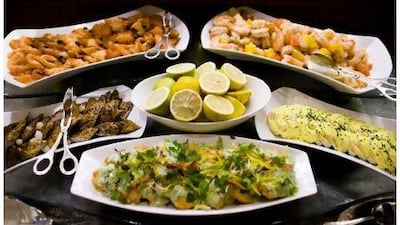The Friday brunch, a hallmark of UAE life, is under pressure from rising food and commodity prices.
Friday brunch at CuiScene Brunch costs between Dh288 (US$78.40) and Dh520 per person and is made up of the following
7 international cuisines
200 items on the pastry menu
10kg Canadian mussels
40kg Omani lobster
30kg Alaskan king crab
Restaurateurs are feeling the squeeze of higher food costs as they strive to keep delivering dozens of kilograms of oysters, fine cuts of meats, and free-flowing chocolate fountains, with the economic model of the brunch already leaving little room for profits.
"It's challenging," said Mark Patten, the vice president of culinary at Atlantis, The Palm, Dubai's biggest resort.
"There is mixed profitability when it comes to brunches. It's important to have our local market view us [as] a great offering. Nobody is here to make a loss, but they're probably not as profitable as other aspects of the business."
Mr Patten said prices of Atlantis's brunch had not gone up from last year, with one of the main aims of the brunch being to generate customer loyalty.
"You have to be very careful in the market. There are certain aspects to why you'd have a brunch," he said. "Now, in Dubai, because it's a very competitive market, to have a great brunch offering for the local Dubai community is a way of giving back something to get brand loyalty.
"The bigger the brunch, the more you're offering, at the best price, the best value, the more you're giving back to the Dubai market."
Atlantis, which charges Dh395 (US$107.50) for its brunch at its Saffron restaurant, and Dh490 for its brunch at Nobu, is trying to source some ingredients from cheaper markets to try to combat increases in food prices.
"Brunch operators tend to focus on their breakeven point and work on how many covers they need in order to break even," said Jonathan Harris at the restaurant consultancy Tribe, based in Abu Dhabi.
"We haven't seen any significant increase in brunch prices in the last year. The UAE has seen an increase in food pricing, and inflation remains reasonably high. Current brunch offers have maintained prices due to the potential of price shock effect."
Restaurateurs say high taxes on alcohol mean drinks make the biggest dent to their profits.
"Obviously, margins are lower for brunches with increased food costs due to volumes of food and increased beverage costs due to free pouring. Operators must also consider the additional staff costs for food preparation and buffet service, especially if a brunch has action stations."
Mr Harris said careful analysis and adjustments could help make costs manageable. "Operators periodically analyse their offers to ensure that costs are maintained at a reasonable level, as well as review the operation to ensure efficiency is maximised: tighter portion control, bringing the brunch offer in closer line to restaurant menus," he said.
"Offering base items that are similar to other restaurant operations will help the operator maintain costs due to economies of scale through bulk buying; as well as unused products being used in the day-to-day operation rather than having to offer specials."
Zuma in Dubai last year doubled the price of its brunch to turn it into a high-end affair and attract a different clientele. It is one of the most expensive brunches in the emirate at Dh550.
"We make money on brunch, but we probably don't make as much money as we do during the week," said Ajaz Sheikh, the director of operations at Zuma, Middle East.
"But we do it because it's not always about making money. As a restaurant we need to offer a brunch to our loyal customers on a Friday and as long as we can break even and make a little bit more it's fine. You offer something to your clients to keep your brand alive. I don't think it's a loss leader, otherwise people just wouldn't do it."
The restaurant has more than 100 staff working on the Friday brunch and does between 120 and 140 covers, said Mr Sheikh.
He said prices of ingredients had in some cases increased by up to 30 per cent, but it was hard to pass those costs on to the consumer.
"You can't just keep adjusting your prices like a yo-yo to make your margins."

